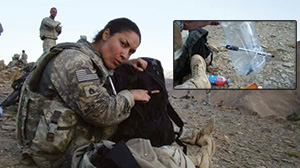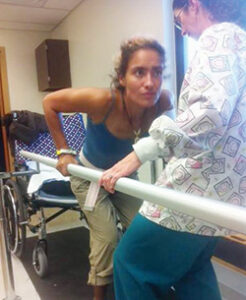
A firefight was nothing new to Aurita Maldonado and her fellow soldiers trekking through the desolate Afghan countryside. What was different on this day in 2008, however, was the bullets punching through her pack. The dripping of some unknown liquid caused her leaders to search for blood that wasn’t there.
The source of wetness was an iced tea bottle pierced with enemy rounds.
Maldonado had dodged bullets that day. Two days later, she would not be so lucky.
She was familiar with the mission’s destination—a bridge— and knew that the harsh realities of combat were waiting.
“If you were intel in Afghanistan, you know that place is dangerous,” said Maldonado, a Purple Heart recipient and member of Chapter 7 in Naguabo, Puerto Rico.
A 200-pound bomb caused a catastrophic blast that shifted the earth beneath the RG-33, causing the mine-resistant light armored vehicle to fly through the air and flip four times before landing and rocking Maldonado’s head.
When the dust settled, soldiers medically evacuated two seriously injured Americans from the battlefield. Also injured was Maldonado, whose right hand had swelled. Although it didn’t break during the explosion, the injured hand was rendered useless for weeks. To this day, she cannot touch her right thumb to her pinky.
“I’ve learned to use my left hand a lot,” she said. “And I have pretty gnarly sciatic pain.”
Although she carries those injuries and harsh memories of combat, the Army veteran, who also served in Iraq, has risen beyond the limitations placed on her from military service.
But the Army wasn’t the only source of tragedy she overcame.
She confronted post-traumatic stress disorder before finding peace in the Alaskan wilderness. A vicious parasite infection nearly claimed her life and a hurricane in Puerto Rico destroyed her home and buried the father of her children, all after her days roaming Afghan valleys and Iraqi cities.
Maldonado chronicled her journey of suffering and prevailing in her book, “The Zen of Dancing in the Rain: Becoming One With the Storm.”
She joined the Army just five days after 9/11, turning down a scholarship to the University of Chicago. Instead, she became a linguist and signals intelligence voice intercept operator, twice attending the Defense Language Institute in Monterey, California, first to learn Korean and later Chinese.
Three months after reporting to Fort Hood, Texas (renamed to Fort Cavazos in 2023), she found herself in Iraq with the 1st Cavalry Division.
“At 5-foot-4, that massive patch nearly took up my entire arm,” she said. “I was an analyst. I went on missions a handful of times, but the majority of the things I did was on the [forward operating base].”
Being on base didn’t exclude her from enemy attacks. Rocket-propelled grenades seemed to be an everyday occurrence, and explosions at the gate were not out of the ordinary.
While she returned stateside physically unscathed, emotionally, memories of Iraq had pierced her psyche.
“I joked that nothing was wrong with me because I picked up every hobby under the sun,” said Maldonado. “But I avoided any concept of therapy.”


She muscled through her Afghanistan deployment and proved to be a valuable asset.
“We needed a female who could ruck with us on long missions,” recalled Andrew Jaunich, a former infantry officer and enlisted counterintelligence soldier. “We didn’t have Afghan resources and needed someone to search women we encountered.”
Jaunich recalls Maldonado being an excellent soldier. She always volunteered for dangerous missions and could “hold her own” with the infantry platoon.
“She could ruck forever,” said Jaunich.
On one mission that stretched 14 miles across a valley, two mortar rounds sat atop her rucksack like any other soldier in the infantry platoon.
“I was very impressed with her ability to volunteer for those missions, especially when she hadn’t been on them before,” added Jaunich.
She parted ways with the Army in 2010 but didn’t let her wartime experiences slow her down. Maldonado became an ultramarathon competitor, which was a familiar activity to an avid runner who routinely dashed the base perimeter. Producers with the television channel TNT took notice of Maldonado and selected her to participate in “72 Hours,” a reality TV competition in Fiji.
That’s when misfortune struck again.
Fiji’s tropical, moist forests took a toll when she indulged in a slug. Three days after returning from the archipelago nation, she began experiencing symptoms of a parasite infection.
“There was a biting sensation on my body, and my left leg wasn’t working,” explained Maldonado.
She went from an emergency room to the Phoenix VA Medical Center, where doctors discovered tens of thousands of rat lungworm parasites, known to cause severe gastrointestinal or central nervous system disease in humans, according to the Centers for Disease Control and Prevention. Her health looked grim as the infection paralyzed her below the waist, and her colon and bladder were shutting down.
The combat-seasoned veteran and avid long-distance runner known for volunteering for any mission was bedridden and knocking on death’s door. However, she bounced back, and on her 30th birthday, she walked out of the hospital with the assistance of a walker. The following month, she taught her first Zumba class.


She was pregnant when Hurricane Maria struck the island, careening Maldonado to another crisis. But unsurprisingly, she persevered, eventually welcoming two children into the world.
By 2021, Maldonado began putting pen to paper, and 261 pages poured out. Her book has been heralded as a “captivating and inspirational memoir that transcends genres,” according to a review by Literary Titan. “It’s a must-read for anyone seeking motivation and a glimpse into the transformative power of resilience and determination.”
“Aurita’s story is one of stubborn determination not to let the past define the present,” said DAV National Commander Nancy Espinosa. “The Army was just one source of hardship, but no matter what life throws her way, Aurita has been a shining example of a champion conquering her trials.
“DAV is proud to have Aurita Maldonado in our ranks.”





